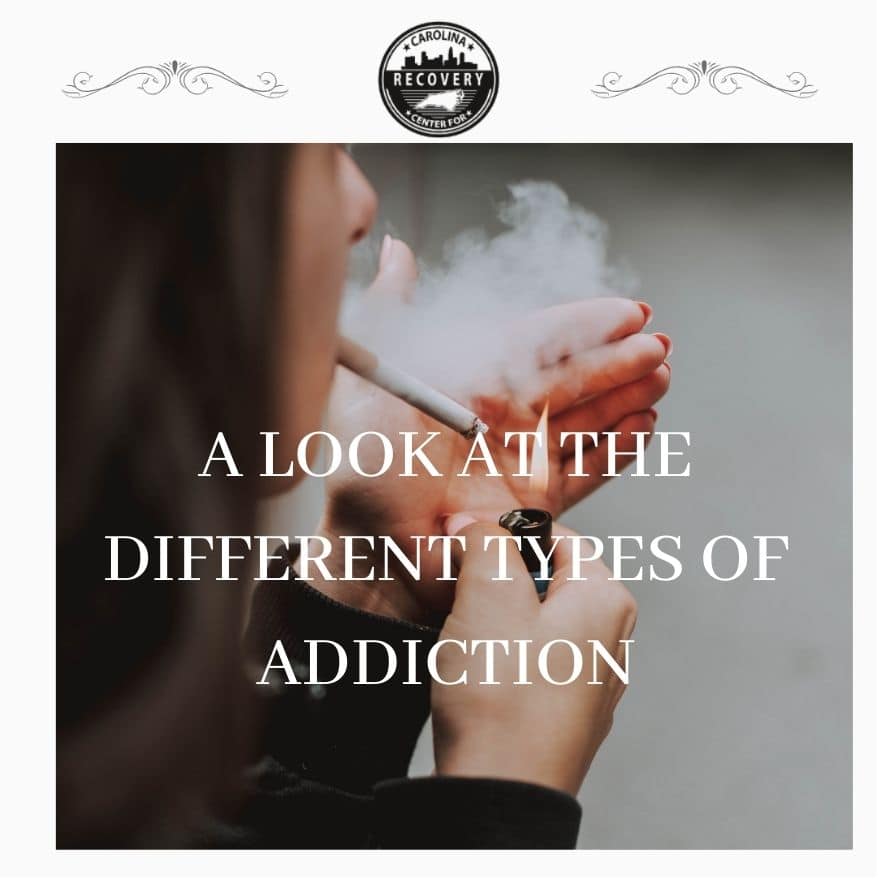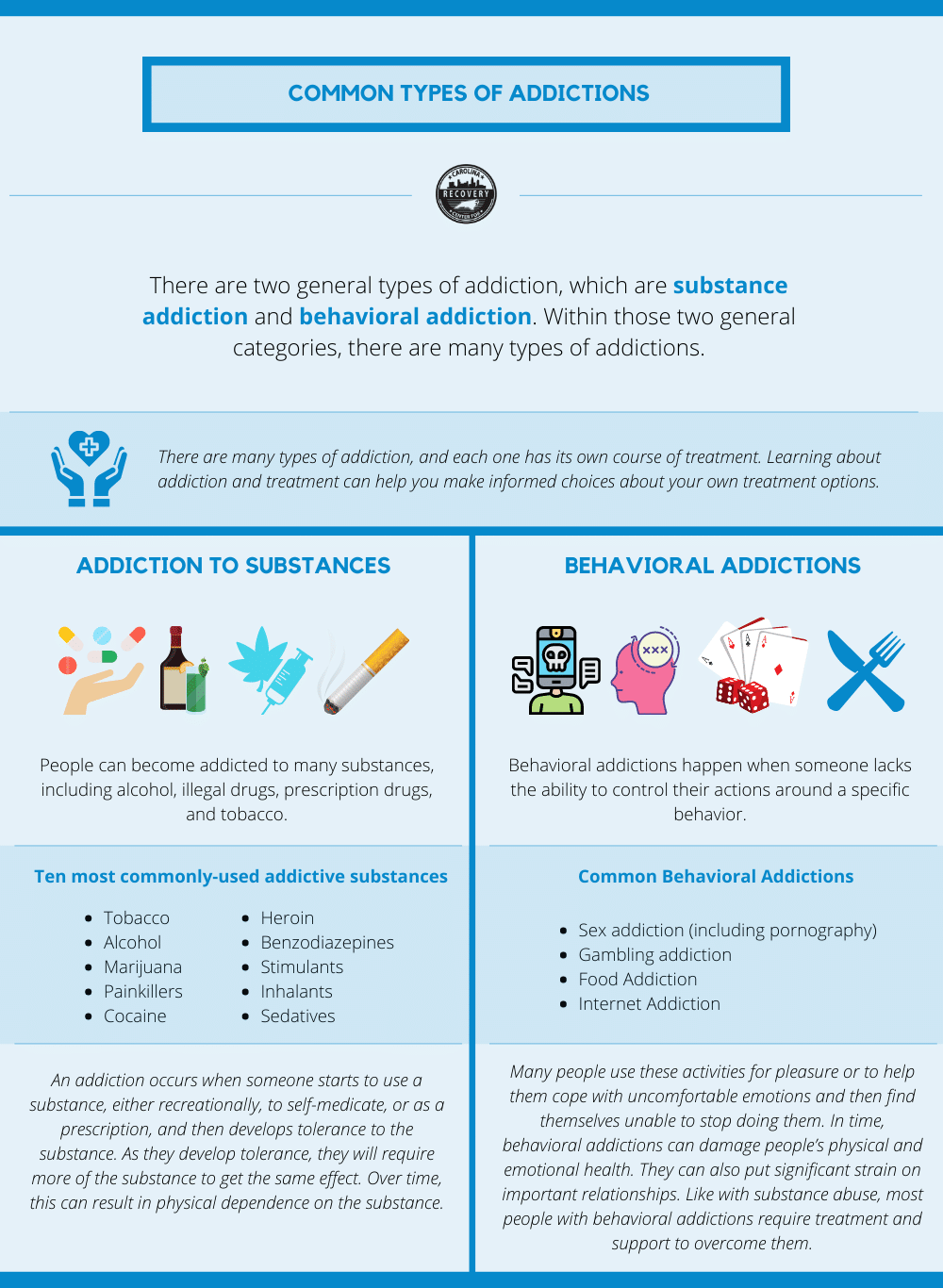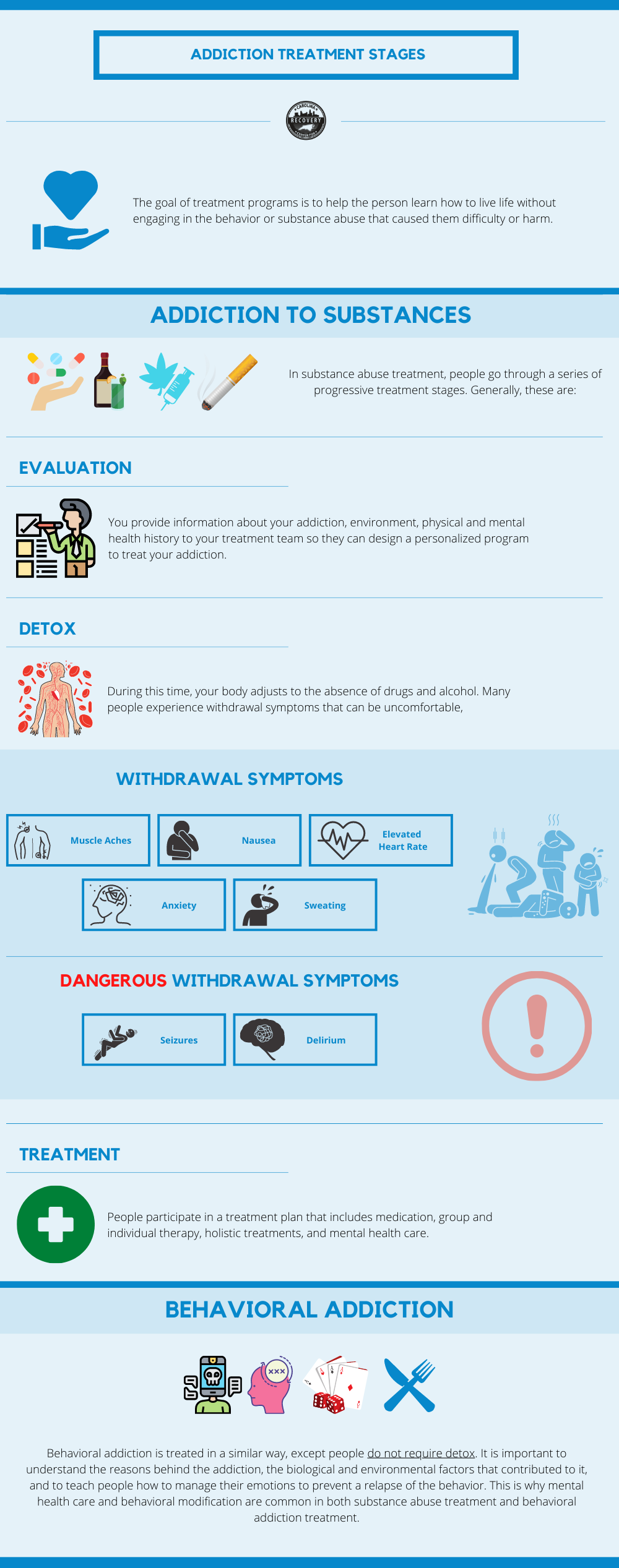A Look at Different Types of Addiction

Medically Verified: 2/1/24
Medical Reviewer
Chief Editor

All of the information on this page has been reviewed and verified by a certified addiction professional.
Most people have a general idea about what addiction is, either from personal experience or from what is portrayed in popular media. The reality of addiction is often different than what people see in movies. Addiction describes an emotional or physical dependence on a substance or behavior. Someone can become dependent on a substance or activity because their brain releases dopamine–a pleasure hormone–when they engage in it. Sometimes, people feel good or even high when taking drugs, drinking, or engaging in certain behaviors. Other times, they may experience relief from difficult emotions like sadness, anger, or boredom. Any time there is a connection between behavior and pleasure, there is the potential for an addiction to develop.
While we can’t see the inner workings of someone’s brain, it is easy to see the effects of addiction on a person’s life. They may suffer negative consequences to their social and financial health or experience damage to their physical and mental health. They may lose opportunities, have strained relationships, or get caught up in illegal activities to support their addiction.
There are many types of addiction, and each one has its own course of treatment. Learning about addiction and treatment can help you make informed choices about your own treatment options.
What Are Some Common Types of Addiction?

There are two general types of addiction, which are substance addiction and behavioral addiction. Within those two general categories, there are many types of addictions.
Addiction to Substances
People can become addicted to many substances, including alcohol, illegal drugs, prescription drugs, and tobacco. According to addiction experts, the ten most commonly-used addictive substances are:[1]
- Tobacco
- Alcohol
- Marijuana
- Painkillers
- Cocaine
- Heroin
- Benzodiazepines
- Stimulants
- Inhalants
- Sedatives
An addiction occurs when someone starts to use a substance, either recreationally, to self-medicate, or as a prescription, and then develops tolerance to the substance. As they develop tolerance, they will require more of the substance to get the same effect. Over time, this can result in physical dependence on the substance.
Behavioral Addictions
Behavioral addictions happen when someone lacks the ability to control their actions around a specific behavior. Some common behavioral addictions include:
- Sex addiction (including pornography)
- Gambling addiction
- Food Addiction
- Internet Addiction
Many people use these activities for pleasure or to help them cope with uncomfortable emotions and then find themselves unable to stop doing them. In time, behavioral addictions can damage people’s physical and emotional health. They can also put significant strain on important relationships. Like with substance abuse, most people with behavioral addictions require treatment and support to overcome them.
How Are Different Addictions Treated?

In treatment programs for both types of addictions, the goals are the same: to help the person learn how to live life without engaging in the behavior or substance abuse that caused them difficulty or harm.
In substance abuse treatment, people go through a series of progressive treatment stages. Generally, these are:
- Evaluation: You provide information about your addiction, environment, physical and mental health history to your treatment team so they can design a personalized program to treat your addiction.
- Detox: During this time, your body adjusts to the absence of drugs and alcohol. Many people experience withdrawal symptoms that can be uncomfortable, including muscle aches, nausea, elevated heart rate, anxiety, and sweating. Some withdrawal symptoms can be dangerous, including seizures and delirium.
- Treatment: People participate in a treatment plan that includes medication, group and individual therapy, holistic treatments, and mental health care.
Behavioral addiction is treated in a similar way, except people do not require detox. It is important to understand the reasons behind the addiction, the biological and environmental factors that contributed to it, and to teach people how to manage their emotions to prevent a relapse of the behavior. This is why mental health care and behavioral modification are common in both substance abuse treatment and behavioral addiction treatment.[2]
Recognizing the Signs of Addiction
Addiction can be difficult to recognize, whether it is an addiction to substances or a behavioral addiction. Knowing the signs of addiction can help you identify the signs of addiction as soon as possible so that you can get the help you need to overcome it. Signs of both types of behavioral and substance addiction include:
- Thinking about the behavior or substance a lot
- Needing more to achieve the same result
- Taking more medication than prescribed/engaging in a behavior more often
- Increasing isolation
- Changes in mood, sleep, or appetite
- Falling behind at work, home, or school–including personal hygiene
- Participating in illegal or dishonest behavior to protect or fund the addiction
- Experiencing withdrawal symptoms if you reduce or stop
If you or a loved one is displaying any of the common signs of addiction, it is important to reach out to a qualified addiction treatment center for advice or to get started with a treatment plan.
Find The Mental Health and Substance Abuse Treatment You Deserve
If you or someone you love require treatment for addiction of any kind, you are not alone. The staff at the Carolina Center for Recovery can help you take the necessary steps to get the treatment you need to overcome addiction.
If you have been putting off addiction treatment, do not wait another day. Call today for more information about our programs.
References:

